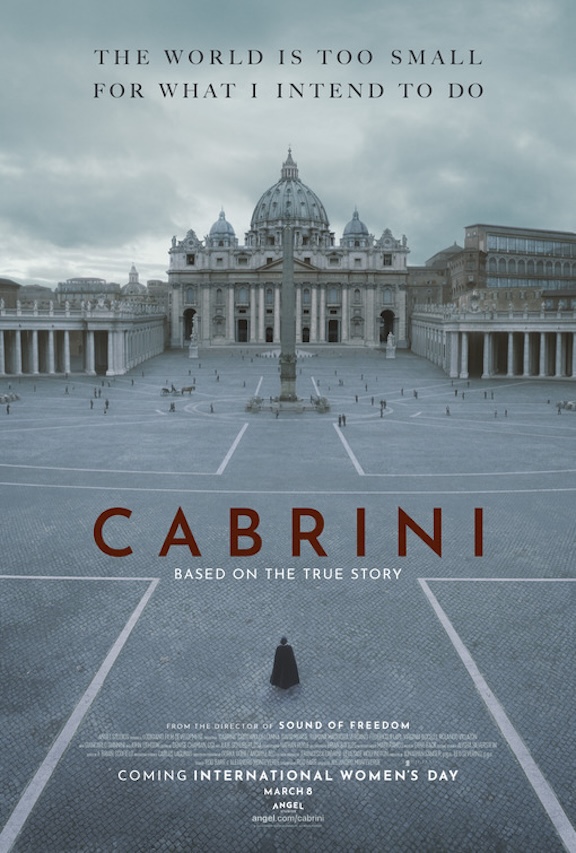In 1850, a small and sickly girl, the youngest of thirteen children, was born two months prematurely to a farm family in the Italian region of Lombardy. Francesca Cabrini would suffer from poor health her entire life.
When in her teens she decided to give her life to Christ, she was rejected by the Daughters of the Sacred Heart, who considered her too weak to endure convent life. But she persisted and became a nun in 1877, taking the name by which we know her now: Frances Xavier Cabrini.
Years before, while visiting her uncle, Fr. Don Luigi Oldini, she placed violets into paper boats, dropped them into a stream, and imagined they carried her and other missionaries to China, where the great St. Francis Xavier had journeyed 300 years before.
When she founded the Missionary Sisters of the Sacred Heart of Jesus in 1880, she told Pope Leo XIII of her wish to travel with her small group of Sisters to Asia to bring the Lord’s love to the suffering poor there. But the pope had a better idea and sent her to the United States.
Pope Leo expressed skepticism even of that journey and its challenges, given her weakness (a worry compounded when people met her by the fact that she was barely 5 feet tall), but she told him, “We can serve our weakness, or we can serve our purpose. We can’t do both.”
Cabrini, the new film by the director of Sound of Freedom, Alejandro Monteverde, gives us Mother Cabrini in New York and in Rome, and – in both great cities – she found more hostility than help. But her faith and determination, as we know, overcame every obstacle.

Before she died in 1917, Mother Cabrini had established schools, hospitals, and orphanages – in the United States and around the world: sixty-seven in all. And all of them were run by women. Not for nothing is the official release date for the film March 8: International Women’s Day.
In New York in the late 1880s, principally in Manhattan, Frances Cabrini (superbly portrayed by Italian actress Cristiana Dell’Anna) encountered slums, hunger, disease, and virulent anti-Italian sentiment – even among many Irish Catholics, not least among them Archbishop Michael Augustine Corrigan (David Morse).
With George J. Marlin, I wrote a book, Sons of St. Patrick: A History of the Archbishops of New York, that deals in part with this period. So, I know enough to say that, as history, Cabrini is uneven. For instance, Mr. Monteverde (and screenwriter Rod Barr) present Mother Cabrini in several tense confrontations with “Mayor Gould” of New York (John Lithgow). But New York City never had a mayor named Gould.
A New York Times muckraker named Calloway (Jeremy Nobb) writes, at Cabrini’s behest, a blistering front-page story asserting that the city’s Italians are forced to live like rats. But if there was a journalist of that name, I’ve found no reference to him.
Then there’s the opera singer Disalvo (played by Rolando Villazón), based perhaps on Enrico Caruso. (It’s Caruso’s remastered voice dubbed in for DiSalvo’s singing of “Vesti La Giubba” from Leoncavallo’s Pagliacci.) Disalvo’s anticlericalism makes him unwilling to help the Catholic nun who has come to him seeking financial support for his poor countrymen struggling in New York.

In another film, such lapses in historical authenticity might have been egregious missteps. It’s not the case here. History is important in Cabrini, but drama is more important. And, as they say, it’s “Based on the true story.”
And what a story it is. This little woman (Miss Dell’Anna is 5’5” but in her scenes with Mr. Morse and Mr. Lithgow – both of whom are 6’4” – you get the right sense of the disproportionate moral power Mother Cabrini was able to exercise over all the men God sent her to battle, like David against Goliath. And in just about every case in which Mother Cabrini went toe-to-toe with these men (even the muckraker has no interest in helping her at first), she won them over – building her “empire of hope” on the way to sainthood (proclaimed by Pius XII in 1946).
The cinematography and art direction in Cabrini evoke time and place better than most historical films, including movies with massively larger budgets. I’m thinking of the New York street scenes in Coppola’s The Godfather Part II and Scorsese’s Gangs of New York. Not as grandly as those films, but just as true.
Every so-called biopic succeeds or fails based on the believability of its star, and Cabrini soars thanks to Miss Dell’Anna’s Oscar-worthy performance.
Whether she’s arguing with the archbishop or the mayor or stating her case before the Italian Senate (the indefatigable Mother Cabrini made twenty-three trans-Atlantic crossings), Dell’Anna is pitch perfect. Her Cabrini is tender and terrifying in resolve. When a construction foreman scoffs at her demand that half the workers on a hospital building project be Italian, she says: “We built Rome. I’m sure we can handle a hospital.”
And when another says, “This is not a job for women,” her reply states the obvious: “Men could never do what we [women] do.”
The fine cast in Cabrini includes Romana Maggiora Vergano, as Vittoria, a prostitute who helps Mother Cabrini upon her arrival in Manhattan. Giancarlo Giannini is fine as Leo XIII, although, except for the papal vestments, it’s not a close resemblance. Federico Ielapi and Liam Campora are immigrant boys who are among the first children brought into the first Five Points orphanage founded by the Missionary Sisters.
Uncompromising in its Catholicism, Cabrini is the can’t-miss film of 2024.
To find a theater near you click here.
__________
Cabrini has an MPAA rating of PG-13 for “thematic material, some violence, language and smoking.” Again. Its premiere is in early March. Mark your calendars. The distributor is Angel Studios of The Chosen and Sound of Freedom fame.















